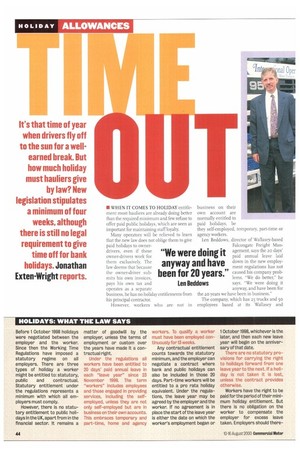HOLIDAYS: WHAT THE LAW SAYS
Page 46

Page 47

If you've noticed an error in this article please click here to report it so we can fix it.
Before 1 October 1998 holidays were negotiated between the employer and the worker. Since then the Working Time Regulations have imposed a statutory regime on all employers. There are three types of holiday a worker might be entitled to: statutory,
public and contractual. Statutory entitlement under the regulations represents a minimum with which all employers must comply.
However, there is no statutory entitlement to public holidays in the UK, apart from in the financial sector. It remains a matter of goodwill by the employer, unless the terms of employment or custom over the years have made it a contractual right.
Under the regulations all workers have been entitled to 20 days' paid annual leave in each "leave year" since 23 November 1999. The term "workers" includes employees and those engaged in providing services, including the selfemployed, unless they are not only self-employed but are in business on their own accounts. This embraces temporary and part-time, home and agency
workers. To qualify a worker must have been employed continuously for 13 weeks.
Any contractual entitlement counts towards the statutory minimum, and the employer can negotiate a contract where bank and public holidays can also be included in those 20 days. Part-time workers will be entitled to a pro rata holiday equivalent. Under the regulations, the leave year may be agreed by the employer and the worker. If no agreement is in place the start of the leave year is either the date on which the worker's employment began or
1 October 1998, whichever is the later, and then each new leave year will begin on the anniversary of that date.
There are no statutory provisions for carrying the right to holidays forward from one leave year to the next. If a holiday is not taken it is lost, unless the contract provides otherwise.
Workers have the right to be paid for the period of their minimum holiday entitlement. But there is no obligation on the worker to compensate the employer for excess leave taken. Employers should there
fore get workers to enter into an agreement which provides that the worker will compensate his employer for the additional days taken as holiday.
A worker must give his employer notice of his intention to take any leave. The notice must be issued before the holiday and the period of notice must be at least twice as long as the holiday itself.
An employer can require a worker to take his holidays on specific dates, provided he gives the worker advance notice equalling twice the number of days to be taken. Similarly, an employer can issue notices to employees instructing them not to take leave. Where an employer has received a holiday request but does not want a worker to take leave, the notice must be issued the same number of days in advance as the time the employer wishes to prohibit being taken.
If the worker is seeking time off to observe a religious day and is from an ethnic or racial background to which that religious day predominantly applies, a refusal to allow time off could amount to race discrimination. Recent family
friendly legislation should be remembered too. For example, irrespective of his length of service, a worker is entitled to a reasonable amount of unpaid time off during working hours where it is "reasonable for him or her to do so to look after a dependent".
Likewise, parental and maternity leave cannot be held by the employer to constitute holiday, and the worker's holiday entitlement runs in addition to these entitlements.
A worker who has been unlawfully denied his holiday rights can bring a claim for compensation before an
Employment Tribunal. If he suffers detrimental treatment for trying to exercise his statutory holiday rights, he can again claim compensation—and an employee would be able to argue that it was an automatically unfair dismissal, irrespective of his length of service. This could lead to a claim at an employment tribunal too, with a maximum compensatory awn rrl of £50,000.
II Jonathan Exton-Wright Is a partner In the Employment Law Department of DIA, the International law firm.








































































































